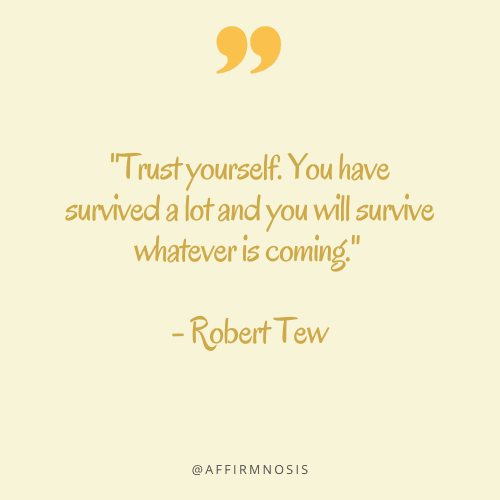Self-trust and self-confidence are essential qualities for personal and professional success. Yet, many individuals struggle with negative self-talk, self-doubt, and a tendency to rely on others’ opinions more than their own.
In this article, we will explore tips and concepts for building self-trust and self-confidence, including setting SMART goals, embracing imperfection, and practicing vulnerability. By developing these skills, individuals can improve their ability to make decisions, take risks, and achieve their goals.
At the heart of this article is the idea that self-trust and self-confidence are not innate traits but can be developed and strengthened through intentional effort. We will explore the role of personal values and goal-setting in defining success, as well as the importance of seeking professional help to address underlying trauma affecting self-esteem.
Whether you are a student, professional, or simply someone looking to improve your sense of self-worth, this article offers practical advice and insights to help you boost your self-trust and self-confidence.
Key Takeaways
- Self-trust and self-confidence are distinct skills that benefit life by making good decisions, playing to strengths, feeling peace, and having healthier relationships.
- Childhood experiences and trauma can lead to issues with self-trust and self-confidence, but practicing vulnerability, setting personal boundaries, and defining core life values can help build them.
- Redefining personal success based on goals and values, setting SMART goals, and highlighting strengths can help build self-confidence.
- Honesty, authenticity, good communication skills, and keeping commitments are essential for building trust with others.
Understanding Self-Trust
In analyzing the concepts related to self-trust and self-confidence, it is essential to understand that individuals with good self-trust possess a strong inner voice and are less likely to second-guess their decisions. This can lead to higher emotional intelligence and a sense of comfort in their skin.
The article emphasizes the importance of practicing vulnerability and setting personal boundaries in building this sense of self-trust. By being vulnerable, individuals can learn to trust themselves and their instincts. Setting personal boundaries helps individuals to respect their own needs and desires, which can lead to greater self-trust and confidence.
It is important to note that childhood experiences and trauma can affect one’s ability to develop self-trust and self-confidence. However, by identifying and meeting one’s own needs, listening to intuition, and replacing negative self-talk with positive self-talk, individuals can overcome self-doubt and build a healthy sense of self-trust.
Overall, cultivating self-trust and self-confidence are essential skills for finding success in both personal and professional life.

Building Self-Confidence
Building self-confidence involves embracing imperfection and vulnerability, identifying personal strengths, and setting SMART goals.
Embracing imperfection means accepting oneself and recognizing that it is okay to make mistakes. It also involves being vulnerable and allowing oneself to be seen authentically.
Identifying personal strengths is crucial because it helps in feeling confident in one’s abilities. This involves taking the time to reflect on one’s strengths and accomplishments, which can lead to a greater sense of self-worth.
Setting SMART goals is also important because it helps in achieving success and gaining confidence. SMART goals are specific, measurable, attainable, realistic, and time-bound. By setting these goals, individuals can track their progress and gain a sense of accomplishment when they achieve them.
Another way to build self-confidence is by being yourself, focusing on your strengths, and expressing yourself. This involves being authentic and true to oneself, which can be challenging in a society that often values conformity.
Focusing on one’s strengths and using them to achieve success can also help in building confidence. Additionally, expressing oneself, whether it be through writing, art, or speaking, can lead to a greater sense of self-awareness and self-expression.
Finally, learning to make decisions and sticking to them can also help in building self-trust and confidence. By making decisions and seeing them through, individuals can gain a sense of control over their lives and feel more confident in their ability to make good choices.
Overcoming Self-Doubt
Overcoming self-doubt requires consistent effort and a willingness to address underlying issues that contribute to feelings of insecurity and uncertainty. It is important to recognize that self-doubt is a common experience and can be caused by a variety of factors such as past failures, negative self-talk, and comparison to others.
Here are three tips for overcoming self-doubt:
- Practice self-compassion: Be kind and gentle with yourself. Acknowledge your feelings of self-doubt and remind yourself that it is okay to make mistakes and that failure is a natural part of the learning process. Be your own cheerleader and celebrate your successes, no matter how small they may seem.
- Challenge negative self-talk: Negative self-talk can be a major contributor to self-doubt. Identify the negative thoughts that are holding you back and challenge them with positive affirmations. Focus on your strengths and accomplishments, and remind yourself that you are capable of achieving your goals.
- Take action: The best way to overcome self-doubt is to take action towards your goals. Break down your goals into manageable steps and take action towards them every day. Each small success will help build your confidence and reduce feelings of self-doubt. Remember, it’s okay to make mistakes along the way – they are opportunities for growth and learning.
Building Trust with Others
Establishing trust with others is a crucial aspect of forming healthy and productive relationships. Trust is built on a foundation of honesty, transparency, and good communication skills.
Being authentic and genuine helps to establish trust, as people are more likely to trust someone who is honest about their intentions and actions. Good communication skills, including listening well, being respectful, and speaking kindly, are also essential for building trust with others.
Keeping commitments is another important aspect of building trust. When we make a promise, we are essentially creating a bond of trust with the person we are making the promise to. By following through on our commitments, we show others that we are reliable and trustworthy.
Asking for feedback and implementing it can also lead to personal growth and strengthen relationships. By being open to feedback, we show that we value the opinions and perspectives of others, which can help to build trust and respect in our relationships.
20 quotes on self-trust and self-confidence:
- “Trust yourself. You know more than you think you do.” – Benjamin Spock
- “Believe in yourself and all that you are. Know that there is something inside you that is greater than any obstacle.” – Christian D. Larson
- “To be yourself in a world that is constantly trying to make you something else is the greatest accomplishment.” – Ralph Waldo Emerson
- “Believe in yourself! Have faith in your abilities! Without a humble but reasonable confidence in your own powers, you cannot be successful or happy.” – Norman Vincent Peale
- “Trust yourself. Create the kind of self that you will be happy to live with all your life.” – Golda Meir
- “Confidence comes not from always being right but from not fearing to be wrong.” – Peter T. McIntyre
- “You have within you right now, everything you need to deal with whatever the world can throw at you.” – Brian Tracy
- “The only limit to our realization of tomorrow will be our doubts of today.” – Franklin D. Roosevelt
- “Believe you can and you’re halfway there.” – Theodore Roosevelt
- “The way to develop self-confidence is to do the thing you fear and get a record of successful experiences behind you.” – William Jennings Bryan
- “To trust one’s mind and to know that one is worthy of happiness is the essence of self-esteem.” – Nathaniel Branden
- “Low self-confidence isn’t a life sentence. Self-confidence can be learned, practiced, and mastered–just like any other skill. Once you master it, everything in your life will change for the better.” – Barrie Davenport
- “Don’t wait until everything is just right. It will never be perfect. There will always be challenges, obstacles, and less than perfect conditions. So what? Get started now. With each step you take, you will grow stronger and stronger, more and more skilled, more and more self-confident, and more and more successful.” – Mark Victor Hansen
- “Trust yourself. You have survived a lot and you will survive whatever is coming.” – Robert Tew
- “With realization of one’s own potential and self-confidence in one’s ability, one can build a better world.” – Dalai Lama
- “One important key to success is self-confidence. An important key to self-confidence is preparation.” – Arthur Ashe
- “You gain strength, courage, and confidence by every experience in which you really stop to look fear in the face. You are able to say to yourself, ‘I have lived through this horror. I can take the next thing that comes along.’ You must do the thing you think you cannot do.” – Eleanor Roosevelt
- “I was always looking outside myself for strength and confidence, but it comes from within. It is there all the time.” – Anna Freud
- “Confidence is a habit that can be developed by acting as if you already had the confidence you desire to have.” – Brian Tracy
- “Trust yourself, you know more than you think you do.” – Benjamin Spock
These quotes emphasize the importance of self-trust and self-confidence in overcoming obstacles and achieving success.
20 affirmations that may help with self-trust and self-confidence:
- “I trust my intuition and my inner wisdom.”
- “I am confident in my ability to make my dreams a reality.”
- “I trust in my ability to overcome obstacles.”
- “I have faith in my capacity to learn and grow.”
- “I am capable and strong, I can weather any storm.”
- “My past experiences have equipped me with great strength and wisdom.”
- “I embrace the unknown because I believe in my ability to navigate it.”
- “I am proud of the person I am becoming.”
- “I know my worth and I will not let anyone undermine it.”
- “I am deserving of success, happiness, and fulfillment.”
- “I stand by my decisions and beliefs, I am my own rock.”
- “I am brave and not afraid to keep going, even when things are difficult.”
- “I have the power to change my life and shape my future.”
- “I am resilient, I bounce back from adversity.”
- “I am a work in progress and every step forward is a victory.”
- “I deserve to be happy and I allow myself to express my joy.”
- “Every day, I become more confident, powerful, and capable.”
- “I am enough just the way I am.”
- “I am patient and kind to myself in my journey of personal growth.”
- “I trust in my journey and every step I take is bringing me closer to my highest good.”
Remember, affirmations are most effective when you truly believe in what you’re saying. So try to choose the ones that resonate with you most, and repeat them to yourself daily or whenever you need a confidence boost.




























































